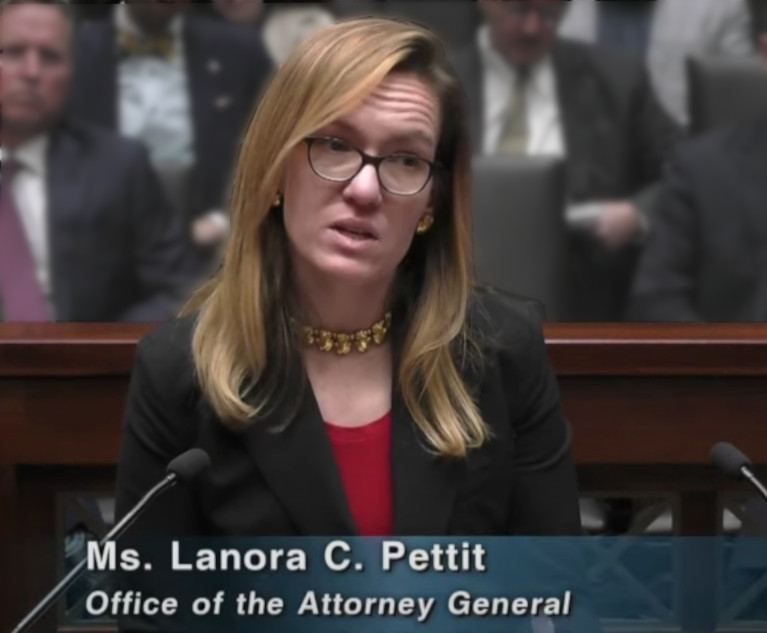Experts: Deeper Hole Dug for Judge Who Hugged Amber Guyger, Botham Jean's Killer
While 204th Criminal District Judge Tammy Kemp's statements to the media in defense of giving Amber Guyger a hug and Bible might help her in the court of public opinion, they could have the opposite effect in the defense of her existing ethics complaint, and provide fodder for a new ethics violation.
October 09, 2019 at 01:00 PM
5 minute read
 Judge Tammy Kemp gives Amber Guyger her personal Bible and a hug. Image via WFFA Video/YouTube
Judge Tammy Kemp gives Amber Guyger her personal Bible and a hug. Image via WFFA Video/YouTube
The Dallas judge who's facing an ethics complaint for giving a hug and Bible to convicted murderer and ex-police officer Amber Guyger may have further exposed herself to a sanction because of statements she gave to national news media to defend her actions.
While 204th Criminal District Judge Tammy Kemp's statements to the media could help her in the court of public opinion, they could have the opposite effect in the defense of her ethics complaint and even give fodder to a new complaint. This is because ethics rules bar judges from commenting publicly on pending cases. In this litigation, the window has not closed for post-trial motions or appeals.
Two judicial ethics experts said it's likely Kemp will face a sanction for her conduct after the trial, since Texas judicial canons mandate that judges always remain impartial, never show bias to a party generally and prohibit judges from showing bias based on religion.
In a widely republished article, Kemp told the Associated Press that she's never before acknowledged her Christian faith to a defendant but was spurred to do it after Guyger told the judge she didn't know how to seek God's forgiveness and didn't own a Bible.
The judge defended her actions, saying the trial was over, her statements weren't on the official record, and that she had come off the bench to hug Guyger and speak to her about Christianity.
"I didn't want her to go back to the jail and to sink into doubt and self-pity and become bitter," Kemp told the news outlet. "She still has a lot of life ahead of her following her sentence and I would hope that she could live it purposefully."
But the Freedom From Religion Foundation, a nonprofit that challenges religious displays in government, filed an Oct. 3 ethics complaint against Kemp with the Texas Commission on Judicial Conduct the day after the trial.
Related story:
Ethics Complaint Filed Against Judge Who Gave Bible to Amber Guyger After Murder Trial
The fact that the story from Kemp's interview has spread so far is not going to help her before the judicial conduct commission, some experts say.
"It is more likely it will come before the commission. It is more likely that the commission will take that into account," said Herring & Panzer partner Chuck Herring of Austin, who authored a book on Texas attorney and judicial ethics. "In theory, it shouldn't affect whether the commission imposes a sanction or not, but if the public image of the judiciary has been affected or impacted by a judge's conduct, then I think they are more likely to pay very close attention."
Herring questioned the accuracy of Kemp's statement to the media that her conduct arose after the trial was over. He explained that a defendant can still file a motion for a new trial that would require the judge's ruling. For that reason, the judicial conduct commission might still consider the Guyger matter as a pending proceeding. If so, an ethics rule, which prohibits a judge from publicly commenting on a pending case, may come into play. Other rules expect judges to maintain their appearance of impartiality even in their extrajudicial activities.
"I feel badly for her, because she seems to be well-intentioned," Herring said. "But I think she was ill-advised to engage in that conduct."
Austin judicial ethics solo practitioner Lillian Hardwick wrote in an email that when judges receive widespread publicity for their actions, the judicial conduct commission often sanctions them using a standard in the Texas Constitution, which prohibits judges from violating ethics rules willfully or persistently, engaging in conduct inconsistent with a judge's duties, or casting public discredit on the judiciary or administration of justice.
Even when the judge doesn't specifically invite the publicity, this constitutional standard applies because the commission views the intentional, underlying conduct as the reason behind the publicity. When the judge does invite the publicity, the commission only has to decide if the conduct was inconsistent with the judge's duties.
"This instance is especially problematic as it suggests that a judge may explain his or her actions in some way other than a legal opinion," Hardwick said. "In that the judge considers her behavior OK, as the trial was over, I'm sure that she will receive an order of additional education, along with a sanction."
Kemp didn't return a call or email seeking comment before deadline.
This content has been archived. It is available through our partners, LexisNexis® and Bloomberg Law.
To view this content, please continue to their sites.
Not a Lexis Subscriber?
Subscribe Now
Not a Bloomberg Law Subscriber?
Subscribe Now
NOT FOR REPRINT
© 2025 ALM Global, LLC, All Rights Reserved. Request academic re-use from www.copyright.com. All other uses, submit a request to [email protected]. For more information visit Asset & Logo Licensing.
You Might Like
View All


Trending Stories
- 1Inherent Diminished Value Damages Unavailable to 3rd-Party Claimants, Court Says
- 2Pa. Defense Firm Sued by Client Over Ex-Eagles Player's $43.5M Med Mal Win
- 3Losses Mount at Morris Manning, but Departing Ex-Chair Stays Bullish About His Old Firm's Future
- 4Zoom Faces Intellectual Property Suit Over AI-Based Augmented Video Conferencing
- 5Judge Grants TRO Blocking Federal Funding Freeze
Who Got The Work
J. Brugh Lower of Gibbons has entered an appearance for industrial equipment supplier Devco Corporation in a pending trademark infringement lawsuit. The suit, accusing the defendant of selling knock-off Graco products, was filed Dec. 18 in New Jersey District Court by Rivkin Radler on behalf of Graco Inc. and Graco Minnesota. The case, assigned to U.S. District Judge Zahid N. Quraishi, is 3:24-cv-11294, Graco Inc. et al v. Devco Corporation.
Who Got The Work
Rebecca Maller-Stein and Kent A. Yalowitz of Arnold & Porter Kaye Scholer have entered their appearances for Hanaco Venture Capital and its executives, Lior Prosor and David Frankel, in a pending securities lawsuit. The action, filed on Dec. 24 in New York Southern District Court by Zell, Aron & Co. on behalf of Goldeneye Advisors, accuses the defendants of negligently and fraudulently managing the plaintiff's $1 million investment. The case, assigned to U.S. District Judge Vernon S. Broderick, is 1:24-cv-09918, Goldeneye Advisors, LLC v. Hanaco Venture Capital, Ltd. et al.
Who Got The Work
Attorneys from A&O Shearman has stepped in as defense counsel for Toronto-Dominion Bank and other defendants in a pending securities class action. The suit, filed Dec. 11 in New York Southern District Court by Bleichmar Fonti & Auld, accuses the defendants of concealing the bank's 'pervasive' deficiencies in regards to its compliance with the Bank Secrecy Act and the quality of its anti-money laundering controls. The case, assigned to U.S. District Judge Arun Subramanian, is 1:24-cv-09445, Gonzalez v. The Toronto-Dominion Bank et al.
Who Got The Work
Crown Castle International, a Pennsylvania company providing shared communications infrastructure, has turned to Luke D. Wolf of Gordon Rees Scully Mansukhani to fend off a pending breach-of-contract lawsuit. The court action, filed Nov. 25 in Michigan Eastern District Court by Hooper Hathaway PC on behalf of The Town Residences LLC, accuses Crown Castle of failing to transfer approximately $30,000 in utility payments from T-Mobile in breach of a roof-top lease and assignment agreement. The case, assigned to U.S. District Judge Susan K. Declercq, is 2:24-cv-13131, The Town Residences LLC v. T-Mobile US, Inc. et al.
Who Got The Work
Wilfred P. Coronato and Daniel M. Schwartz of McCarter & English have stepped in as defense counsel to Electrolux Home Products Inc. in a pending product liability lawsuit. The court action, filed Nov. 26 in New York Eastern District Court by Poulos Lopiccolo PC and Nagel Rice LLP on behalf of David Stern, alleges that the defendant's refrigerators’ drawers and shelving repeatedly break and fall apart within months after purchase. The case, assigned to U.S. District Judge Joan M. Azrack, is 2:24-cv-08204, Stern v. Electrolux Home Products, Inc.
Featured Firms
Law Offices of Gary Martin Hays & Associates, P.C.
(470) 294-1674
Law Offices of Mark E. Salomone
(857) 444-6468
Smith & Hassler
(713) 739-1250







